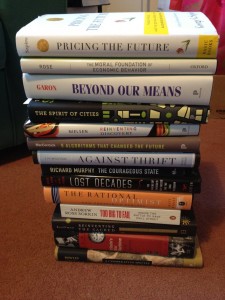A Guest Blog by Philip Whiteley
Note: Philip is one of the co-authors of a forthcoming (2012) book, New Normal, Radical Shift. This is a guest post from the Radical Shift blog.
Here are some highlights of a recent speech on financial services:
‘In 1989 the CEOs of the seven largest banks in the United States earned on average $2.8 million. That was almost 100 times the median US household income. By 2007 … CEO compensation among the largest US banks had risen almost tenfold to £26 million. That was over 500 times the median US household income.’
And yet, the speaker complained, returns for investors were negligible over this period of widening income inequality, and the actions of banks had imposed huge costs on wider society. He added: ‘Temporary support for the global banking system during the crisis peaked at around a quarter of global GDP. The permanent damage to world GDP from the crisis is still being counted, but it is likely to be several multiples of that.’ The problem lies in serious imbalances between privatised returns and socialised risks, he said. ‘This calls for fundamental reform.’
The speaker was not the leader of the Occupy protests, nor a left-wing populist politician, but Andrew Haldane, Executive Director, Financial Stability at the Bank of England, giving the Wincott Annual Memorial Lecture on 24 October. Full text of the speech is available here.
The fact that a senior regulator at the Bank of England broadly agrees with the tented protestors causing such a fuss on the steps of St Paul’s Cathedral in London and in Zuccotti Park in lower Manhattan is an indication that we are entering new territory.
Our politics is struggling to catch up with the scale and the pace of the economic crisis; battle lines often fought on the basis of the ‘old normal’ agenda of public versus private, left versus right and regulation versus deregulation. This will not do. Much fuller understanding comes from understanding vested interests, following the money, and looking at actual behaviour.
A deeper understanding of the current crisis comes in the recent book [amazon_link id=”0691145180″ target=”_blank” ]The Economics of Enough[/amazon_link], by Diane Coyle of this blog. In a single sentence, she summarises our dilemma:
“Alongside the potential impact of climate change, we face a debt crisis, a result of untenable social security arrangements in ageing societies as well as the impact of bailing out the banks that caused the financial crisis; a strong sense of unfairness caused by inequality and the failure of certain groups to benefit much or at all from greater prosperity; and the depletion of social capital against a background of declining trust in authority and institutions.”
(Our review of her book is published here.)
The need for a longer term perspective to governance is pressing; sustainability is for the public sector, as well as corporations. One possibility is for the second chamber of a democracy to be constitutionally devoted to long-term matters such as pensions policy, infrastructure, and higher education. This institution would have power of veto over a government wanting to borrow above a certain percentage of GDP. Members would serve one-term only, but probably for longer than the standard four or five years. There would be no party whips.
Another factor driving short-termism has been the use of technology. Fast computing has combined with over-optimistic faith in efficient markets. City traders often pile into a stock or bond not because they see value in the underlying asset, but because they think the price will rise in the next 48 hours. Some use ultra-fast broadband, and seek to make money in the nano-seconds it takes for price changes to reach other dealers. These activities exacerbate the already destabilising investment bubbles that can create havoc in the real economy. Speculative finance is now out of control, and is increasingly criticised by business leaders as well as trade unionists (see this earlier post).
But one of the problems with making these criticisms is that they are often interpreted as a general attack on all financial services. Many debates descend into sectarianism: Wall Street good/Wall Street bad; global capitalism good/global capitalism bad. This is hopelessly inadequate. We desperately need to move beyond the confines of ‘left/right’ politics.
- ‘Beyond left and right’ is the subject of a chapter in the forthcoming book New Normal, Radical Shift. Excerpt here.

 Meanwhile, I’m reading Philip Coggan’s [amazon_link id=”1846145104″ target=”_blank” ]Paper Promises[/amazon_link] to review it for
Meanwhile, I’m reading Philip Coggan’s [amazon_link id=”1846145104″ target=”_blank” ]Paper Promises[/amazon_link] to review it for